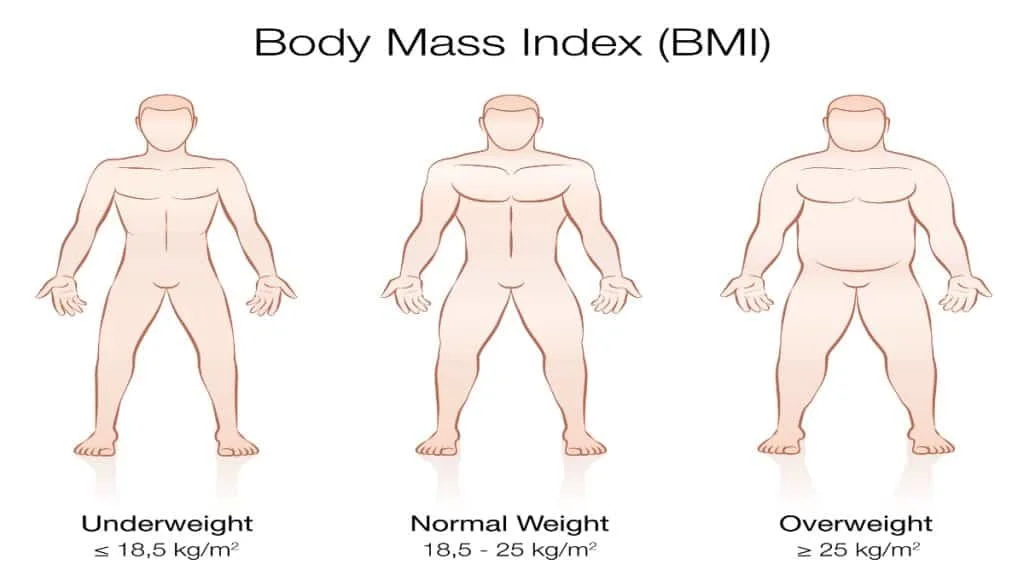A BMI of 28 is considered overweight for both females and males. So how does this affect your health?
Well, since BMI is just a screening tool, it’s not possible to say categorically that a 28 BMI score is a guarantee of poor health. For example, you could, in theory, be very lean while having a body mass index of 28.
Of course, it’s safe to say that most people with a BMI of 28 are carrying too much body fat and, as a result, should seek to lose weight by employing moderate calorie restriction and regular exercise.
Related BMIs:
- Normal BMI for women
- Is a BMI of 19 good?
- Is a BMI of 20 good?
- Is a BMI of 21 good?
- Is a BMI of 22 good?
- Is a BMI of 23 good?
- Is a BMI of 24 good?
- Is a BMI of 25 good?
- Is a BMI of 26 good?
- Is a BMI of 27 bad?
- Is a BMI of 29 bad?
Is a 28 BMI bad for a female?

Is a 28 BMI bad for a female? Yes, a BMI of 28 is generally seen as a bad body mass index for a woman because it’s comfortably in the overweight category.
Yet, a body mass index of twenty-eight is actually a couple of BMI points lower than average for a female. So, in this sense, a woman who registers a 28 BMI score is likely to be a bit leaner than the average lady.
Add in the fact that women naturally have more body fat than men—and the fact that they tend to store that fat favorably, i.e., around their thighs and hips rather than their waist—and you can see that a BMI of 28 really isn’t that bad.
To be sure, most women with a body mass index of 28 would benefit from losing weight, and perhaps even a substantial amount.
Still, in the grand scheme of the global obesity epidemic, a 28 BMI isn’t all that bad.
Is a BMI of 28 bad for a male?

Is a BMI of 28 bad for a male? If the male in question has much more body fat than muscle mass, then a BMI of 28 is definitely bad for a man.
This is particularly true, seeing as men have a more central fat storage distribution than women. When fat piles up around your waist, it can start to accumulate around organs like your liver (visceral fat), which can cause chronic disease in the long run.
Of course, some serious athletes and weight lifters do have a BMI of 28. But this is obviously not the case for the population at large, meaning that most men with a 28 BMI should seek to lose weight.
Let’s not forget that it’s perfectly possible to be somewhat muscular and somewhat fat while having a body mass index of 28. Still, even with a more balanced body, you don’t want to fat to pile up because then you might become obese.
What does a 28 body mass index look like?

What a 28 BMI actually looks like depends on the person’s gender, build, and body composition.
Men typically have more muscle mass, less body fat, and a larger bone structure than women. So at an identical BMI, males and females can look very different.
Yet, even two males, for example, can look radically different at the same BMI.
You could have relatively little muscle mass but loads of fat, which would mean that you’re sarcopenically obese (often referred to as “skinny-fat”).
On the other hand, you could be really muscular and have very little body fat.
The problem with BMI is that it can miss people who are obese in terms of body fat but not in terms of body mass index. This is why certain population groups often need to lower the obesity threshold.
Common BMI 28 scores, grades, and results

Here are all of the BMI 28 scores and grades with a description of what they (might) mean for your body.
28.1 BMI
If you have a 28.1 BMI, then you’re three points into the overweight category and two points away from being obese. To keep your weight under control, you should probably aim to lose some body fat.
28.2 BMI
A 28.2 BMI is considered overweight for men and women and is often an indication that a person has excessive body fat, which can be damaging to their health, especially over the long term.
28.3 BMI
A BMI of 28.3 is comfortably in the overweight body mass index classification for males and females. While you can be muscular with a 28.3 BMI, most people of this size have too much adipose tissue.
28.4 BMI
If you’ve got a BMI of 28.4, then you’re well into the overweight BMI category and should seek to lose weight. You can do this by eating in a calorie deficit and performing both strength training and cardio.
28.5 BMI
A 28.5 BMI is on the higher end of the overweight category. As such, those with a BMI of 28.5 are in danger of becoming obese. In fact, depending on your body fat, it’s possible to be obese with a 28.5 BMI.
28.6 BMI
A BMI of 28.6 is classed as overweight because it’s over 3 BMI points above the healthy weight cut-off point. This is the case for both women and men.
28.7 BMI
If you have a BMI of 28.7, then you very likely need to lose weight unless you’re a lean and muscular athlete. While having a high BMI isn’t always bad, a 28.7 BMI is considerably higher than the recommended range.
28.8 BMI
Having a 28.8 BMI is definitely a strong indicator that a person is carrying too much fat tissue on their body. A person who has a BMI of 28.8 is close to becoming obese.
28.9 BMI
If you have a 28.9 BMI, then you’re only one BMI point away from being obese. As such, unless you need to be heavy for your job/sport (i.e., rugby player), you should try to lose weight and reduce your BMI.
Conclusion: Can a BMI of 28 be good or not?
Can a BMI of 28 ever be good? Yes, if you’re lean and muscular and exercise regularly, then it’s possible for a 28 BMI score to be good, especially if you have a large frame.
On the other hand, if you have a slim or average build and a body mass index of 28, then you probably have more fat than muscle. In this case, you’d want to lose weight and ideally build muscle with resistance training to create a healthier body composition.
References
- Apovian C. M. (2016). Obesity: definition, comorbidities, causes, and burden. The American journal of managed care, 22(7 Suppl), s176–s185.
- Alammar, M., Alsoghayer, S., El-Abd, K., & Alkhenizan, A. (2020). Diagnostic Accuracy of Body Mass Index (BMI) When Diagnosing Obesity in a Saudi Adult Population in a Primary Care Setting, Cross Sectional, Retrospective Study. Diabetes, metabolic syndrome and obesity : targets and therapy, 13, 2515–2520. https://doi.org/10.2147/DMSO.S263063

